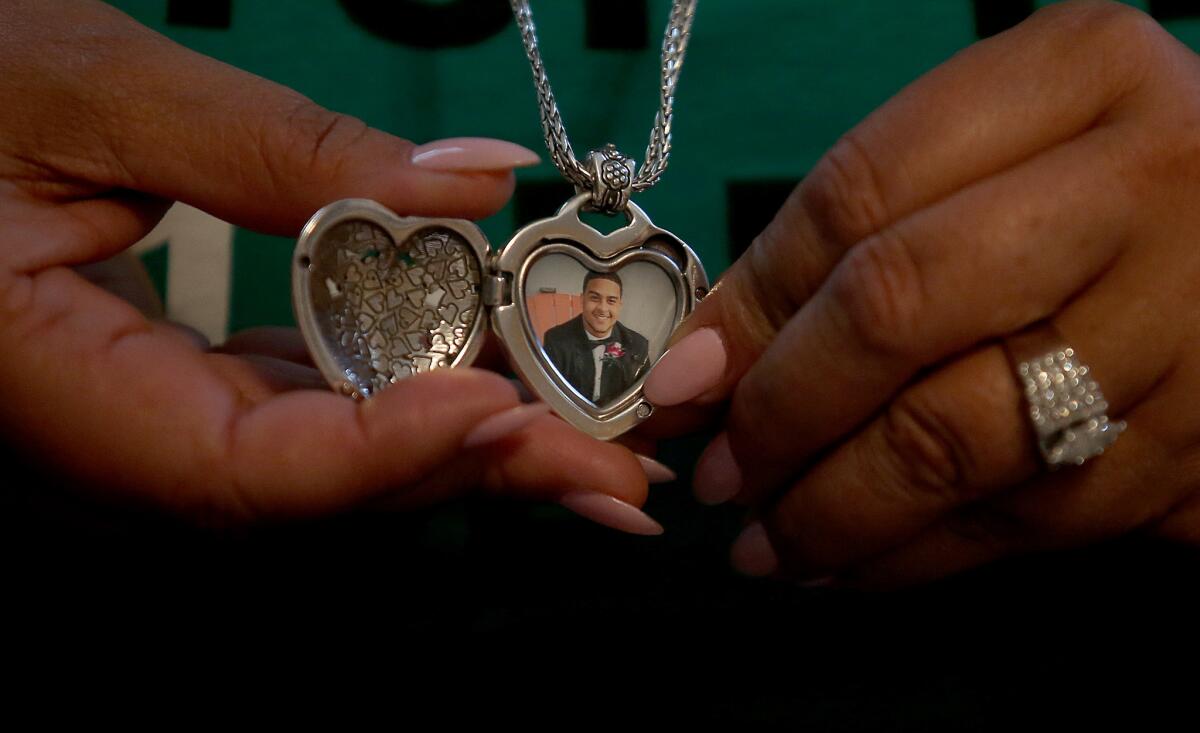Gang code of silence compounds a family’s heartbreak

- Share via
I spent Sunday night at a candlelight vigil, held to mark the anniversary of a young man’s shooting death and nudge anyone who knows anything to come forward.
I heard a grieving mother beg the crowd for tips that might help police and watched burly high school football players drop to their knees and sob.
And I left there feeling angry — and wondering what it means to the family of a homicide victim when the crime remains unsolved.
Bijan Shoushtari was shot to death in August 2013 while riding in a car with his buddies along Crenshaw Boulevard, a few miles from his home. He had just graduated from Hamilton High and was about to enroll in college.
There’s a giant billboard now near the spot where he was shot, offering a $50,000 reward for information leading to his killers. But nothing useful has reached police.
That’s not uncommon in a big city like Los Angeles.
But it compounds the grief for families and friends who are trying to make sense of the incomprehensible and muster the strength to move on.
“I speak to the mom every week,” said LAPD Det. Matt Courtney, who is working on Bijan’s case. “I know it bothers her to know these people are walking around, getting on with their life, after they took her son’s life away.”
Police suspect from the circumstances — an innocent victim fired on by someone in a passing car — that gang members were involved, all but ensuring a code of silence that makes the crime hard to solve.
“They have a different set of values, if you can call it that,” Courtney said. Gang members don’t tend to snitch on one another. “It goes against their values to tell.”
That boggles the mind of Bijan’s churchgoing family.
“Somebody knows who did it,” his mother, Marsha Jones-Shoushtari, told the crowd of people holding candles, as cars, buses and motorcycles rumbled along busy Crenshaw Boulevard, past the spot where her son was shot.
::
Samantha Shoushtari can’t say it would be easier if she knew who killed Bijan: “It wouldn’t bring my brother back.”
But the emptiness of not knowing is torture.
“It’s frustrating and it’s hurtful,” she said. “It makes you question people’s motives and their conscience.... There’s no sense of justice here.”
Her father is angry at the thought of Bijan’s killers roaming the streets. Her mother is worried they might inflict tragedy on some other family. And she and her sister are perplexed by the enduring silence surrounding a senseless crime.
“I wouldn’t be able to sleep at night if I knew something,” Samantha said. “That’s how we were raised.”
Her family has been making the rounds of radio stations, churches and community meetings, talking about the reward. “You would think that would be an incentive,” she said. “It’s a heavy amount of money that could be life-changing for some people.”
It can also be a painful reminder of a family’s helplessness.
That’s been the lesson for Jocelyn Stewart, whose nephew Kendrick Blackmon, a 22-year-old church musician, was shot to death driving home from a party in 2012. Her family spent the last two years trying to publicize the city’s $50,000 reward, after every tip police ran down led to a dead end.
“I can’t imagine that knowing would take any of the pain away,” said Stewart, a former colleague of mine at The Times. “But it’s crazy when your life is horribly changed, and there’s some faceless actor out there who did this who you may never know.”
::
Bijan’s classmates were shocked by his death, but they aren’t surprised by the silence.
“Gang violence doesn’t get solved,” said Hamilton High senior Simone Richie, “because nobody gives nobody up.”
She and her friends are trying to break that cycle. They wore T-shirts created by a classmate, printed with their mantra: “Guns Down. Voices Up.”
“Losing him was really hard for everybody,” said cheerleader Taylor Pitter. “Bijan was such a positive person. Why would anybody hurt him?”
Bijan’s teachers, too, are wrestling with that question. That’s what drew biology teacher Eva Becker to the unfamiliar turf of Leimert Plaza on Sunday night. “I’ve never been to this park before,” she said, her voice competing with the sound of reggae music and African drums.
She joked about the pranks Bijan pulled in her class, and marveled at how focused on the future he was. She praised his parents for the job they’d done. “He had no limits,” Becker said.
And she felt bound to share a taste of what Bijan left behind: “He didn’t look at this white, chubby, Jewish orthodox teacher,” she said. “He just looked at people.” We could learn from that.
Twitter: @SandyBanksLAT
More to Read
Sign up for Essential California
The most important California stories and recommendations in your inbox every morning.
You may occasionally receive promotional content from the Los Angeles Times.














